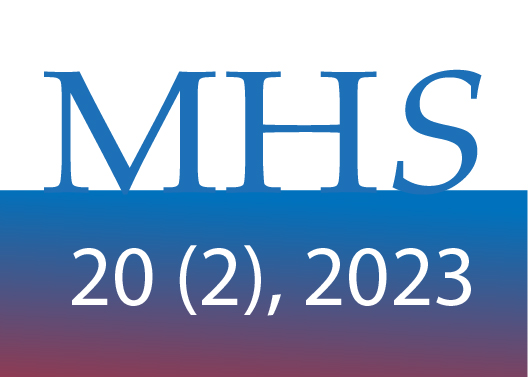Obstáculos e incentivos à mobilidade num sistema de partilha de bicicletas num município espanhol
DOI:
https://doi.org/10.15359/mhs.20-2.6Palavras-chave:
bicicletas, saúde pública, promoção da saúde, atividade físicaResumo
Introdução: O interesse pelo ciclismo urbano está aumentando e o número de programas de bicicletas compartilhadas cresceu rapidamente nos últimos anos. Assim, o objetivo que se pretende atingir neste estudo é saber se fatores como estações do ano, percursos e altitudes afetam a utilização do sistema de bicicletas partilhadas num município espanhol.
Método: Foi desenhado um estudo quantitativo e longitudinal com recolha e análise de dados do BSS de Vilagarcía de Arousa, registando-se um total de 84.183 observações (homens n = 59.159; mulheres n = 25.024). Os dados extraídos do sistema foram coletados e analisados estatisticamente por meio do programa IBM SPSS versão 21.0. Foi estabelecido um valor de significância de p < 0,05.
Resultados: A estação mais utilizada foi a localizada no centro da cidade, representando um total de 39% das observações. A cota neutra, ou seja, sair de uma estação e depositar a bicicleta em outra de mesma altitude, representou 65,5% do total de registros.
Conclusões: O município de Vilagarcía de Arousa apresenta algumas características topográficas favoráveis para ser um serviço rentável que promova hábitos saudáveis como meio de transporte ativo no meio urbano, bem como uma melhoria da mobilidade urbana e um meio ambiente menos poluído.
Referências
Beenackers, M. A., Foster, S., Kamphuis, C., Titze, S., Divitini, M., Knuiman, M., van Lenthe, F. J. y Giles-Corti, B. (2012). Taking up cycling after residential relocation: built environment factors. American Journal of Preventive Medicine, 42(6), 610-615. https://doi.org/10.1016/j.amepre.2012.02.021
Bauman, A., Crane, M., Drayton, B. A. y Titze, S. (2017). The unrealised potential of bike share schemes to influence population physical activity levels–A narrative review. Preventive Medicine, 103, S7-S14. https://doi.org/10.1016/j.ypmed.2017.02.015
Beairsto, J., Tian, Y., Zheng, L., Zhao, Q. y Hong, J. (2022). Identifying locations for new bike-sharing stations in Glasgow: an analysis of spatial equity and demand factors. Annals of GIS, 28(2), 111-126. https://doi.org/10.1080/19475683.2021.1936172
Buck, D. y Buehler, R. (22-26 de enero de 2012). Bike lanes and other determinants of capital bikeshare trips. In Proceedings of the Transportation Research Board 91st Annual Meeting, Washington, DC, USA. https://nacto.org/wp-content/uploads/2012/02/Bike-Lanes-and-Other-Determinants-of-Capital-Bikeshare-Trips-Buck-et-al-12-3539.pdf
Chen, Z., van Lierop, D. y Ettema, D. (2020). Dockless bike-sharing systems: what are the implications?. Transport Reviews, 40(3), 333-353. https://doi.org/10.1080/01441647.2019.1710306
Clockston, R. L. M. y Rojas-Rueda, D. (2021). Health impacts of bike-sharing systems in the US. Environmental Research, 202, 111709. https://doi.org/10.1016/j.envres.2021.111709
Contardo, C., Morency, C. y Rousseau, L. M. (2012). Balancing a dynamic public bike-sharing system. CIRRELT.
Dekoster, J. y Schollaert, U. (2000). En bici, hacia ciudades sin malos humos. Oficina de Publicaciones Oficiales de las Comunidades Europeas.
DeMaio, P. (2009). Bike-sharing: History, impacts, models of provision, and future. Journal of Public Transportation, 12(4), 41-56. https://doi.org/10.5038/2375-0901.12.4.3
Eren, E. y Uz, V. E. (2020). A review on bike-sharing: The factors affecting bike-sharing demand. Sustainable Cities and Society, 54, 101882. https://doi.org/10.1016/j.scs.2019.101882
Faghih-Imani, A., Hampshire, R., Marla, L. y Eluru, N. (2017). An empirical analysis of bike sharing usage and rebalancing: Evidence from Barcelona and Seville. Transportation Research Part A: Policy and Practice, 97, 177-191. https://doi.org/10.1016/j.tra.2016.12.007
Garrard, J., Rose, G. y Lo, S. K. (2008). Promoting transportation cycling for women. The role of bicycle infrastructure. Preventive Medicine, 46, 55-59. https://doi.org/10.1016/j.ypmed.2007.07.010
Hu, B., Zhong, Z., Zhang, Y., Sun, Y., Jiang, L., Dong, X. y Sun, H. (2022). Understanding the influencing factors of bicycle-sharing demand based on residents’ trips. Physica A: Statistical Mechanics and its Applications, 586, 126472. https://doi.org/10.1016/j.physa.2021.126472
Hunt, J. D. y Abraham, J. E. (2007). Influences on bicycle use. Transportation, 34(4), 453-470. https://doi.org/10.1007/s11116-006-9109-1
Julio, R. y Monzon, A. (2022). Long term assessment of a successful e-bike-sharing system. Key drivers and impact on travel behaviour. Case Studies on Transport Policy, 10(2), 1299-1313. https://doi.org/10.1016/j.cstp.2022.04.019
Lee, M., Hwang, S., Park, Y. y Choi, B. (2022). Factors affecting bike-sharing system demand by inferred trip purpose: Integration of clustering of travel patterns and geospatial data analysis. International Journal of Sustainable Transportation, 16(9), 847-860. https://doi.org/10.1080/15568318.2021.1943076
Lu, W., Scott, D. M. y Dalumpines, R. (2018). Understanding bike share cyclist route choice using GPS data: Comparing dominant routes and shortest paths. Journal of Transport Geography, 71, 172-181. https://doi.org/10.1016/j.jtrangeo.2018.07.012
Ma, X., Yuan, Y., Van Oort, N. y Hoogendoorn, S. (2020). Bike-sharing systems’ impact on modal shift: A case study in Delft, the Netherlands. Journal of Cleaner Production, 259, 120846. https://doi.org/10.1016/j.jclepro.2020.120846
Macioszek, E., Świerk, P. y Kurek, A. (2020). The bike-sharing system as an element of enhancing sustainable mobility - A case study based on a city in Poland. Sustainability, 12(8), 3285. https://doi.org/10.3390/su12083285
Mateo-Babiano, I., Bean, R., Corcoran, J. y Pojani, D. (2016). How does our natural and built environment affect the use of bicycle sharing? Transportation Research Part A: Policy and Practice, 94, 295-307. https://doi.org/10.1016/j.tra.2016.09.015
Menghini, G., Carrasco, N., Schüssler, N. y Axhausen, K. W. (2010). Route choice of cyclists in Zurich. Transportation Research Part A: Policy and Practice, 44(9), 754-765. https://doi.org/10.1016/j.tra.2010.07.008
Midgley, P. (2009). The role of smart bike-sharing systems in urban mobility. Journeys, 2, 23-31. https://www.gtkp.com/assets/uploads/20091127-144837-7443-IS02-p23%20Bike-sharing.pdf
Mix, R., Hurtubia, R. y Raveau, S. (2022). Optimal location of bike-sharing stations: A built environment and accessibility approach. Transportation Research Part A: Policy and Practice, 160, 126-142. https://doi.org/10.1016/j.tra.2022.03.022
Munkácsy, A. y Monzón, A. (2017). Potential user profiles of innovative bike-sharing systems: the case of BiciMAD (Madrid, Spain). Asian Transport Studies, 4(3), 621-638. https://doi.org/10.11175/eastsats.4.621
Nieuwenhuijsen, M. J. y Rojas-Rueda, D. (2020). Bike-sharing systems and health (In) MJ, Nieuwenhuijsen and H, Khreis, Advances in Transportation and Health (239-250). Elsevier. https://doi.org/10.1016/B978-0-12-819136-1.00010-3
Ogilvie, F. y Goodman, A. (2012). Inequalities in usage of a public bicycle sharing scheme: Socio-demographic predictors of uptake and usage of the London (UK) cycle hire scheme. Preventive Medicine, 55(1), 40-45. https://doi.org/10.1016/j.ypmed.2012.05.002
Otero, I., Nieuwenhuijsen, M. J. y Rojas-Rueda, D. (2018). Health impacts of bike sharing systems in Europe. Environment International, 115, 387-394. https://doi.org/10.1016/j.envint.2018.04.014
Pucher, J., Buehler, R. y Seinen, M. (2011). Bicycling renaissance in North America? An update and re-appraisal of cycling trends and policies. Transportation Research Part A: Policy and Practice, 45(6), 451-475. https://doi.org/10.1016/j.tra.2011.03.001
Pucher, J., Garrard, J. y Greaves, S. (2011). Cycling down under: a comparative analysis of bicycling trends and policies in Sydney and Melbourne. Journal of Transport Geography, 19(2), 332-345. https://doi.org/10.1016/j.jtrangeo.2010.02.007
Pucher, J., Komanoff, C. y Schimek, P. (1999). Bicycling renaissance in North America? Recent trends and alternative policies to promote bicycling. Transportation Research Part A: Policy and Practice, 33(7), 625-654. https://doi.org/10.1016/S0965-8564(99)00010-5
Rietveld, P. y Daniel, V. (2004). Determinants of bicycle use: Do municipal policies matter? Transportation Research Part A: Policy and Practice, 38(7), 531-550. https://doi.org/10.1016/j.tra.2004.05.003
Rixey, R. A. (2013). Station-level forecasting of bikesharing ridership: Station network effects in three US systems. Transportation research record, 2387(1), 46-55. https://doi.org/10.3141/2387-06
Sanmiguel-Rodríguez, A. (2015). Ambiente urbano y bicicletas compartidas: efectos sobre la actividad física [tesis doctoral]. Universidade de Vigo. http://www.investigo.biblioteca.uvigo.es/xmlui/handle/11093/381
Sanmiguel-Rodríguez, A. (2019). Análisis de las edades, trayectos y minutos de uso en la utilización de un sistema de bicicletas compartidas: el caso del VaiBike en Vilagarcía de Arousa (España). Retos: Nuevas Tendencias en Educación Física, Deporte y Recreación, 35, 314-319. https://doi.org/10.47197/retos.v0i35.66470
Sanmiguel-Rodríguez, A. (2020). Cumplimiento de las recomendaciones de actividad física de la OMS por usuarios de bicicletas públicas en un municipio español. Revista Habanera de Ciencias Médicas, 19(3) e2955. http://www.revhabanera.sld.cu/index.php/rhab/article/view/2955
Sanmiguel-Rodríguez, A. (2022). Bike-sharing systems: Effects on physical activity in a Spanish municipality. Physical Activity Review, 10(2), 66-76. https://doi.org/10.16926/par.2022.10.22
Sanmiguel-Rodríguez, A. y Arufe Giráldez, V. (2019). Impact of climate on a bike-sharing system. Minutes of use depending on day of the week, month and season of the year. Cuadernos de Psicología del Deporte, 19(2), 102-112. https://doi.org/10.6018/cpd.338441
Scheiner, J. (2010). Interrelations between travel mode choice and trip distance: trends in Germany 1976-2002. Journal of Transport Geography, 18(1), 75-84. https://doi.org/10.1016/j.jtrangeo.2009.01.001
Soriguera, F. y Jiménez-Meroño, E. (2020). A continuous approximation model for the optimal design of public bike-sharing systems. Sustainable Cities and Society, 52, 101826. https://doi.org/10.1016/j.scs.2019.101826
Sun, F., Chen, P. y Jiao, J. (2018). Promoting public bike-sharing: A lesson from the unsuccessful Pronto system. Transportation Research Part D: Transport and Environment, 63, 533-547. https://doi.org/10.1016/j.trd.2018.06.021
Talavera-García, R., Romanillos, G. y Arias-Molinares, D. (2021). Examining spatio-temporal mobility patterns of bike-sharing systems: the case of BiciMAD (Madrid). Journal of Maps, 17(1), 7-13. https://doi.org/10.1080/17445647.2020.1866697
Tin, S. T., Woodward, A., Robinson, E. y Ameratunga, S. (2012). Temporal, seasonal and weather effects on cycle volume: an ecological study. Environmental Health, 11(12), 1-9. https://doi.org/10.1186/1476-069X-11-12
Unwin, N. C. (1995). Promoting the public health benefits of cycling. Public Health, 109(1), 41-46. https://doi.org/10.1016/S0033-3506(95)80074-3
Vandenbulcke, G., Dujardin, C., Thomas, I., de Geus, B., Degraeuwe, B., Meeusen, R. y Panis,
L. I. (2011). Cycle commuting in Belgium: spatial determinants and ‘re-cycling’ strategies. Transportation Research Part A: Policy and Practice, 45(2), 118-137. https://doi.org/10.1016/j.tra.2010.11.004
Zhang, L., Zhang, J., Duan, Z. Y. y Bryde, D. (2015). Sustainable bike-sharing systems: characteristics and commonalities across cases in urban China. Journal of Cleaner Production, 97, 124-133. https://doi.org/10.1016/j.jclepro.2014.04.006
Publicado
Como Citar
Edição
Seção
Licença
Termos e condições gerais

MHSalud: Revista en Ciencias del Movimiento Humano y Salud da Universidad Nacional é licenciada sob uma Licença Creative Commons Attribution-NonCommercial-NoDerivatives 3.0 Costa Rica.
A revista está hospedada em repositórios de acesso aberto, como o Repositório Institucional da Universidade Nacional, o Repositório Kimuk da Costa Rica e a Referência.
A fonte editorial da revista deve ser reconhecida. Use para esse fim o identificador doi da publicação.
Política de autoarquivamento: A revista permite o autoarquivamento de artigos em sua versão revisada, editada e aprovada pelo Conselho Editorial da revista para que estejam disponíveis em Acesso Aberto através da Internet. Mais informações no link a seguir: https://v2.sherpa.ac.uk/id/publication/25815


















